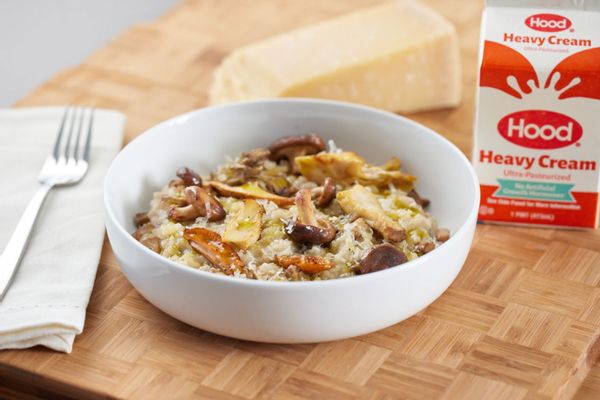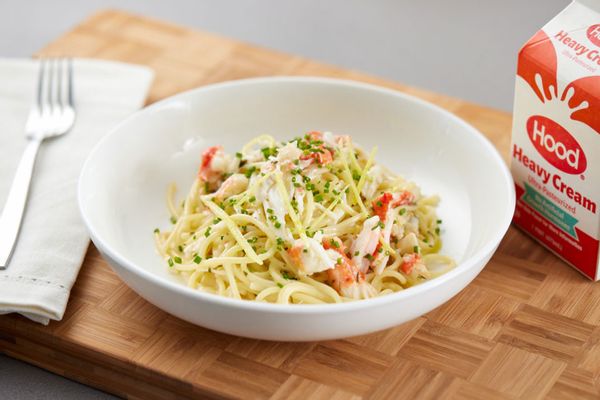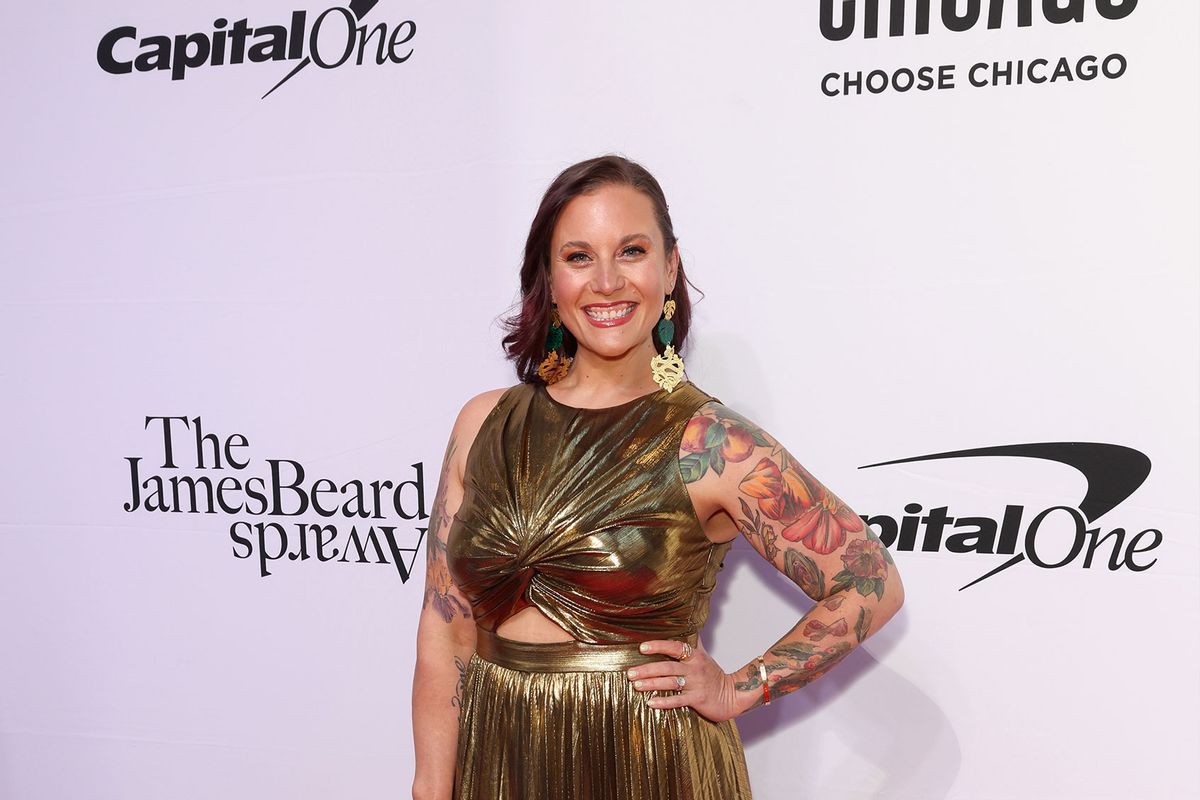Chef Karen Akunowicz is a prominent figure in the Boston dining scene. After her celebrated tenure at Myers & Chang, she expanded her culinary empire with Fox & the Knife, Bar Volpe and Fox & Flight. Not to mention her numerous television appearances.
But what inspired Akunowicz to pursue a career in the kitchen and restaurants?
Read on to learn her tips for reducing food waste in a world of rising food prices, highlights from her time on “Top Chef,” her favorite ingredients, a memorable date, the process behind creating cookbooks — and a bit about how she handles her very own little "berry monster, too.
The following interview has been lightly edited for clarity and length.
I did want to turn back to "Top Chef" for a few questions there. Would you say there was a number one lesson or takeaway you had from either season, or from the experience in general?
I think one of the things about "Top Chef" is that from a more esoteric point of view or big picture point of view, if you can do "Top Chef," if you are lucky enough to be cast on "Top Chef" and compete on a season of "Top Chef," you can do anything.
It's really hard. It remains the hardest competition cooking show on television. It's the real deal. The time is the time. The food's the food, the challenges are the challenges. The judges are awesome and really tough. And if you can go through that, you can really do anything. You should be like, "Well, I did that. I can do anything.' So it's definitely, if you can look at it in that way, I think it's definitely a competence booster.
The other thing that I'll take from it that's interesting is it is also an opportunity to compete with some of the best chefs in your industry. And anytime you are around people that are cooking, competing, working at the same level as you, that is such an opportunity, right? Surround yourself with greatness, surround yourself with greatness. Push yourself to the max of your ability and what you are able to do from that, what you're able to learn from it, what you're able to push yourself to do is pretty incredible. It's an amazing opportunity to meet and cook with the caliber of chefs that compete on Top Chef.
And it really only makes you better. It makes you stronger as a chef, stronger as a person, for sure.
It's also like Chef Camp. It's definitely hard, but you have 16 amazing, amazing chefs all together cooking. It's pretty phenomenal.
Would you say you preferred competing in one season over the other?
I want to say I preferred competing in "All Stars," but the beauty of your first time on "Top Chef" is you don't know. You don't know anything and nobody else knows anything either. So there's kind of a beauty in that, that we're all just like, wait, what's going on?
Whereas when we come back for "All Stars," many of us know each other. We've all gotten a little bit better at playing the game.
Looking back now, do you feel like there was any particular standout dish or dishes that you were really proud of in that moment?
Oh, I've had a lot of dishes that I've made on "Top Chef" that I've been super, super proud of. I'll name two of them. There's a quickfire challenge that was judged by Ali Wong and Randall Park, who I'm a huge, huge fan of. And I made a nasi garang, Indonesian fried rice. And if you've ever made nasi garang, it's an hours-long, long process. And I managed to do it in — it was a quickfire — so it had to be somewhere between 20, 25 minutes. And I really went all out to make that dish and I tasted it and I was like, "Wow, that is really spot on."
Ali Wong and Randall Park both loved it, but Padma said, "Oh my gosh, this tastes like I'm in Indonesia right now. This tastes like a nasi garang."
And on season 13 ... I made a duck dish and I made with a sauce that — I didn't call a mole and I do not want to call it a mole —but it was [made from] beets and I used some orange blossom water and cocoa nib. I was super, super proud of that dish. I think it was delicious. I think it was creative. I think it was beautiful.
What would you say stands out for you as a formative moment that got you into cooking or got you into food at large?
Oh my gosh. Well, I always say I've always loved eating. I do have that story, but I will say, I think that one of the things that has kept me cooking and the reason that I always wanted to own restaurants or have my own space was that I've always thought since I was a little kid, restaurants are magic. We didn't have a lot of money when I was a kid, so if we went out somewhere to eat, it was a really big deal. It was special. It was very special.
Even if it was a very, very casual place. When you're a kid, you don't know the difference. It felt very special and very grown up to me to go out to eat. I always loved the experience of it. There was a restaurant in Kearny, it might've been Belleville, it was called Egan's. And in the front it was quick serve. It was like hot dogs and hamburgers and french fries. And I remember when they would call — the booths and tables were orange — and if you got french fries and gravy, it was a Frenchie with gravy. They would call, "One Frenchie with gravy." And it's so burned in my memory, but they also had a back part of the restaurant that was fancy, and it was dark and wooden booths.There was a swordfish hanging on the wall behind the bar. It was very grown up and fancy.
So there's this piece of me that has always felt like restaurants are like that. I still feel that way. Really magical places like, "Hey, I've had a really bad day. Can we please go to a restaurant I love so that I can feel better?" Or "Hey, we want to celebrate. Let's go to this restaurant. "
I love to celebrate. I think that they're really special places in our community, especially independent restaurants that have so much heart and soul. I think they really are part of the fabric of all of our communities.
I cooked with my mom when I was a kid because that's what you did. But I was trying to impress a girl, and I was trying to get her to go out on a date with me for a really long time, and I finally was like, "Well, you should come to my house and I'll cook for you." And I didn't know how to cook! I lied. I didn't think she would say yes. And she was like, "Yeah, what time do you want me to come over?"
So, I went out and I bought a cookbook and I went to Whole Foods and I bought groceries. I'd never been to Whole Foods before and I probably spent more money than I had ever spent on groceries for one silly little meal. I made pasta puttanesca.I'm sure I didn't rinse the capers. I'm sure they were too salty. I think I used fresh tomatoes instead of canned tomatoes because I was like, "This must be fresher," but it was winter — I didn't know!
But the whole process of making it — it was the first time I had made something and been like, "Oh, this is, like, what cooking is." It was so cool and that was the moment that started my love of cooking and cooking for other people.
 Mushroom risotto (Courtesy of Agustin Floriano for Hood Cream)
Mushroom risotto (Courtesy of Agustin Floriano for Hood Cream)
What are your three most used ingredients?
I feel like if I'm honest about it, it's so boring. My top three would be salt, olive oil, maybe lemon juice. You know, I go through olive oil like people go through water. If you go to my home kitchen, I have three different olive oils that are on my counter that stay there all the time.
I have my own olive oil; I have a Sicilian olive oil blend in partnership with Buona Fortuna in Sicily. I go every year, I go for harvest. It's beautiful, verdant, green, delicious olive oil. People say it's a finishing oil, but I cook with it all the time.
I also have an olive oil from Puglia that has lemons and limes in it, it's not just a flavored oil and I had a case of it in Puglia so I keep that there. I also have a light olive oil from my buddy Brian Malarky that I keep on the counter and cook with all the time. There's, like, very little that I’m making that I'm not putting olive in, on, or in and on.
We need your help to stay independent
Do you have any tips for cutting down on food waste?
If you look at what you're eating, just in your every day — most things you can utilize the whole whatever it is, right?
So one of my iconic — well, maybe not iconic, maybe signature . . .
I'd say it's iconic!
Not sure if i iIve reached that level, but thank you! Anyway, it's the grilled broccoli and caesar salad, which utilizes the entire head of broccoli. Maybe that doesn't seem wildly special, but what do you do at your house? Roast broccoli? I do, I have a two year old, I make broccoli all the time.
At the restaurant is, we take off the stems, we partially grill the stems, cut it in big pieces so it's grilled on the outside and soft on the inside. We shave the stems. Every salad has raw stem as well as grilled broccoli. So, how do you look at that? Even now, especially now, with the price of food — everything is more expensive.
I'm cutting strawberries for my kid and I'm like "You're trying to cut as little as possible to just take the tops off" — so now I make strawberry simple syrup. How do we make sure we're using everything, not wasting money, the salad is a great example at the restaurant
We also make our ricotta — I think our housemade ricotta is so sublime — and we have lots of whey afterwards, so we then use that to brine the pork in our milanese and we use it in my wild boar bolognese instead of milk. We make maybe 5 pounds of ricotta a day, so it's silly to not utilize that.
Those are easy ways to reduce food waste. In my own home, this year, I became much more of a stickler about wasting food. This is ridiculous, we have so much in this country, there's no reason any kid is hungry, and if we have the privilege to have a fridge full of food, we shouldn't be wasting any of it. So now every week, we all have a clean-out-the-fridge dish we make, but now I'm like "I'm not grocery shopping again until we use every single thing we have" and how do we utilize it to the best of our ability? I think there's so many ways to do that.
I think that's an important question all the time, but right now, it's very important in terms of food cost. Every time I cut those strawberries ... kids are like berry monsters, I had to re-up every three days, I got all the berries — the blueberries, raspberries and strawberries, just a berry factory. I cut those tops off the strawberries and last year I thought that was wild.
 Spaghetti al limone (Courtesy of Agustin Floriano for Hood Cream)
Spaghetti al limone (Courtesy of Agustin Floriano for Hood Cream)
I love your cookbooks. Do you have any plans for any upcoming ones?
Well, so it's funny, I wrote this book "Crave" and writing that book was really hard. I didn't work with an author, I wrote the whole book myself.
That's fantastic.
Is it fantastic or is it crazy? I do love it and I love to write and it was such a gift and an amazing experience. My editor told me I'm an excellent writer and asked about the proposal and she was like, "Did you write all these headers?" Yeah, so it's cool and that was so nice, but it's a lot of work.
So when I was finished with that I was like "never again, this is it" . . . but then it's five years later and I'm like "Well, I need a new project." I definitely want to write an Italian cookbook. I have a few ideas, drafts, proposals, thinking about which direction I want to go in. It's not coming soon, but you know, I have at least one more book in me.
Want more great food writing and recipes? Subscribe to Salon Food's newsletter, The Bite.
What’s next for you?
It has been a really busy few years — so there’s part of me that’s always, like, “no more projects" — but that’s not really in my nature.
In terms of restaurants, people always ask “Are you going to do more restaurants?” I always say that when the right space and the right project comes my way, that’s when we pull the trigger on that. I would like — I have so many amazing team members who’ve been with me for a long time and I want to create — there's a part of me that wants to create more so they have more opportunity.
I do love being able to work in television, I think it’s such an amazing, broad, wide medium and I have so much fun and you know, my team and I — we’ve been working on some idea for shows for a while now and you never know if any of that will come to fruition but we look at the broader scope of the food world and I think that there’s just so much opportunity. I’ve been so lucky to work on projects like my olive oil or cookbook — and I think “oh wow, I get to do this? How incredible”. So while our day to day is rooted in the practicality of the restaurants and building the company and the brand — the other projects within the food world are the things that kind of light you up and keep you creative. You need both of those things — at least for me.
Read more
about this topic



Shares